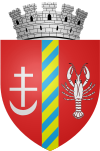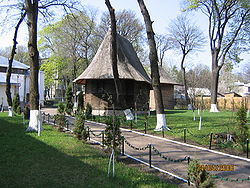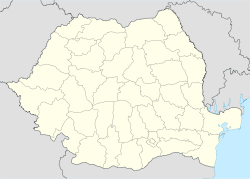- Dorohoi
-
Dorohoi — Municipality — Wooden church in Dorohoi 
Coat of armsLocation of Dorohoi Coordinates: 47°57′35″N 26°23′59″E / 47.95972°N 26.39972°ECoordinates: 47°57′35″N 26°23′59″E / 47.95972°N 26.39972°E Country  Romania
RomaniaCounty Botoşani County Status Municipality Government - Mayor Dorin Alexandrescu (Social Democrat Party) Area - Total 60.39 km2 (23.3 sq mi) Population (2002) - Total 31,073 Time zone EET (UTC+2) - Summer (DST) EEST (UTC+3) Website http://www.primariadorohoi.ro Dorohoi (Romanian pronunciation: [doroˈhoj]) is a city in the Botoşani County, Romania, on the right bank of the Jijia River, which broadens into a lake on the north.
Dorohoi used to be a market for the timber and farm produce of the north Moldavian highlands; merchants from the neighboring states flocked to its great fair, held on the June 12. The settlement is first mentioned in documents from 1408, where a treaty was signed between Moldavian voievode, Alexandru cel Bun, and the King of Poland and Hungary. This suggests that the role of Dorohoi as a commercial center existed long before the founding of the Moldavian state.
Dorohoi used to be the capital of Dorohoi County, but was degraded to a municipality when Romania lost Northern Bukovina to the Soviet Union. On July 1, 1940, units of the Romanian Army took their anger on the local Jews in a pogrom. Despite the antisemitic atmosphere of those times, which included antisemitic laws and seizure of Jewish property, these military actions against the Jews were not endorsed by the Romanian Government. When the conspiracy against the Jews was discovered by the military command, troops were sent to end the abuse. [3]
In the city there is a church built by Ştefan cel Mare.
The city administers three villages: Dealu Mare, Loturi Enescu and Progresul.
Contents
Jews of Dorohoi
Jews first settled in Dorohoi in the 17th Century. It was set up as a Jewish Guild under Moldavia. Jews suffered here during World War I.
- There were 600 Jewish families in Dorohoi in 1803.
- 3,031 people in 1859 (roughly half of the population)
- 6,804 in 1899 (more than half of the population)
- 5,800 in 1930s.
The Jewish population actually increased after the Holocaust as a result of refugees settling there. In 1947, there were 7,600 Jews living in Dorohoi. Following the establishment of Israel, the Jewish population of the Dorohoi steadily decreased. In 1956, there were 2,753 Jews. In 1966, there were 1,013. By 2000, there were only 49 Jews left in Dorohoi.
2010 Romanian floods
The north-eastern town of Dorohoi witnessed 6 deaths during the night of June 28–29 as floods rose to just over 1 metre/3.3 feet in some places. Several roads into Dorohoi remained either washed away or under water.[1] The heavy rain that had been falling for much of the past week in the Balkan country and forecasters have warned that it will continue in northeast Romania until Wednesday morning.[1] The emergency situations spokeswoman Dorina Lupu from Botoşani County said unusually heavy rain had killed 6 people, most in the town of Dorohoi on the 29th.[2]
Population
- 1900: 12,701
- 2000: 31,072
- 2006: 31.130 m: 15.067 , f: 16.063
According to the census from 2002 there was a total population of 30,949 people living in this city. Of this population, 98.32% are ethnic Romanians, 1.45% ethnic Rroma, 0.12% ethnic Jews and 0.02% ethnic Ukranians.[3]
See also
- Global storm activity of 2010
- 2010 Romanian floods
References
External links
Botoşani County, Romania Cities Botoşani (county seat) · Dorohoi

Towns Bucecea · Darabani · Flămânzi · Săveni · Ştefăneşti
Communes Adăşeni · Albeşti · Avrămeni · Băluşeni · Blândeşti · Brăeşti · Broscăuţi · Călăraşi · Cândeşti · Conceşti · Copălău · Cordăreni · Corlăteni · Corni · Coşula · Coţuşca · Cristeşti · Cristineşti · Curteşti · Dersca · Dângeni · Dimăcheni · Dobârceni · Drăguşeni · Durneşti · Frumuşica · George Enescu · Gorbăneşti · Havârna · Hăneşti · Hilişeu-Horia · Hlipiceni · Hudeşti · Ibăneşti · Leorda · Lozna · Lunca · Manoleasa · Mihai Eminescu · Mihăileni · Mihălăşeni · Mileanca · Mitoc · Nicşeni · Păltiniş · Pomârla · Prăjeni · Rădăuţi-Prut · Răchiţi · Răuseni · Ripiceni · Roma · Româneşti · Santa Mare · Stăuceni · Suharău · Suliţa · Şendriceni · Ştiubieni · Todireni · Truşeşti · Tudora · Ungureni · Unţeni · Văculeşti · Viişoara · Vârfu Câmpului · Vlădeni · Vlăsineşti · Vorniceni · Vorona
Categories:- Populated places in Botoşani County
- Cities in Romania
Wikimedia Foundation. 2010.


